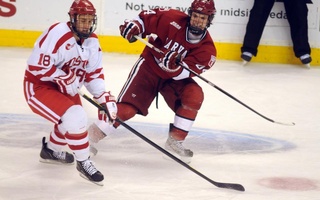In March 2011, the Harvard and Princeton men’s basketball teams squared off in a one-game playoff to decide the Ivy League’s representative in the NCAA tournament. The Tigers prevailed in a thrilling finish, swishing a basket at the buzzer to defeat the Crimson, 63-62.
That excitement could soon be an annual possibility, as the Ivy League is exploring the prospect of organizing an annual postseason tournament for the conference’s automatic NCAA tournament bid. The Ivy League is currently the only automatic-bid conference without a tournament, instead sending its regular season champion to the 68-team tournament.
According to Ivy League Executive Director Robin Harris, Ivy coaches are preparing a proposal for a four-team, two-round tournament that would include the top four finishers in the regular season standings.
Harris said the coaches’ pitch also includes the removal of one game from the schedule in order to avoid any additional missed class time for players. The Ivy League consciously avoids this problem by playing regular season basketball games almost exclusively on Friday and Saturday nights.
In order to be approved, the proposal must wind its way through the Ivy League bureaucracy in a series of steps. First, the coaches must send the proposal to the conference’s eight athletic directors for a vote. If the athletic directors reach a consensus to approve the motion, it then proceeds to a policy committee, consisting of university vice presidents from each school. Following an endorsement by the policy committee, the eight university presidents render a final decision, according to Yale men’s basketball coach James Jones.
The proposal is patterned after the Ivy League lacrosse tournament, instituted in 2010, which also features four teams. University and conference administrators took two years to implement the lacrosse tournament after its initial proposal.
The Ivy basketball coaches have explored the possibility of staging a conference tournament in the past, but Jones said that the idea has never gotten beyond the athletic directors’ vote.
“I think that some ADs are worried about the added expense [of a tournament],” Jones said. “But we’ve seen what happened with the one-game playoff in 2002 [between Yale and Penn] and last year [between Harvard and Princeton] that there’s some positive things to come out of it financially.”
The 2011 playoff between Harvard and Princeton attracted enough fans to sell out Yale’s 3,100-seat Payne Whitney Gymnasium, and many more watched the Tigers’ victory on ESPN3’s national broadcast. But Harris stressed that finances would not be the primary concern in coming to a decision.
“We haven’t really speculated as to whether it would be profitable or not,” Harris said. “We certainly hope it could be, but that’s not how we make our determinations.”
By staging a conference tournament, smaller leagues can earn what might be their only national television exposure of the year. In 2012, ESPN aired 137 games in 11 days as part of its “Championship Week” coverage, including 23 Division I conference title games.
But skeptics argue that awarding the league’s automatic bid to the winner of a conference tournament reduces the league’s chances of sending its best team to the NCAA tournament, as the potential for an upset increases in a single-elimination format. In March, Sun Belt regular-season champion Middle Tennessee State fell to Arkansas State in the Sun Belt tournament quarterfinals, paving the way for Western Kentucky to receive the league’s NCAA tournament bid, despite finishing with a losing record. Middle Tennessee State, which finished 27-7 and seven games above Western Kentucky in the regular season standings, was left out of the NCAA tournament.
“There’s a compelling argument that the Ivy League does it right as of now,” Harvard Assistant Director of Athletics Kurt Svoboda said. “You get the best team over the course of a season, as opposed to one team getting hot over the course of a weekend.”
The Crimson, the two-time defending Ivy League champion and the consensus favorite in 2012-13, could lose the most from the potential for upsets in a conference tournament. But Harvard men’s basketball coach Tommy Amaker still supports the initiative as positive for the conference as a whole.
“I have been in favor of ways for us to increase our brand of Ivy League basketball for the future,” Amaker said. “I’m not trying to look at it from where we are today, I’m trying to look at it from where we are as a league. And if that’s what we decide on as a league I will be in favor of it, I’ve been like that from day one.”
Read more in News
Harvard Researcher Develops New Method for Autism DiagnosisRecommended Articles
-
Fencing Squads Fall Just Short of League CrownsThe Harvard fencing teams came up just short of an Ivy League title at the Ivy League Championships, Part II yesterday, bouting against conference opponents Columbia, Brown, and Princeton.
-
Tigers Next Up For Men's LacrosseAfter all the hype that surrounded a No. 12 preseason ranking and the third-best recruiting class in the country, the Harvard men’s lacrosse team has a better chance of finishing dead last in the Ivy League than becoming one of the top four teams who will be invited to the inaugural Ivy League lacrosse tournament.
-
Women's Lacrosse Posts Strong NumbersThree decades ago, the Harvard women’s lacrosse team (9-5, 5-2 Ivy) began what would become an incredible statistic: 11 Ivy ...
-
 A Critique of Ivy League Rules
A Critique of Ivy League Rules -
Keep the LeagueCurrently, the Ivy League is the only conference with an automatic bid to the NCAA that determines its representative via the regular season championship rather than using a playoff tournament.
-
 Innertube Water Polo Makes a Splash
Innertube Water Polo Makes a Splash













